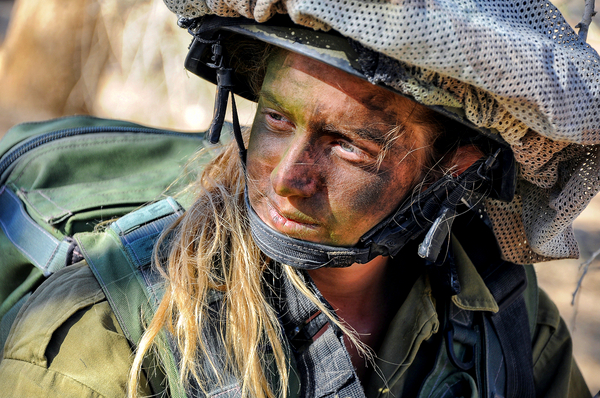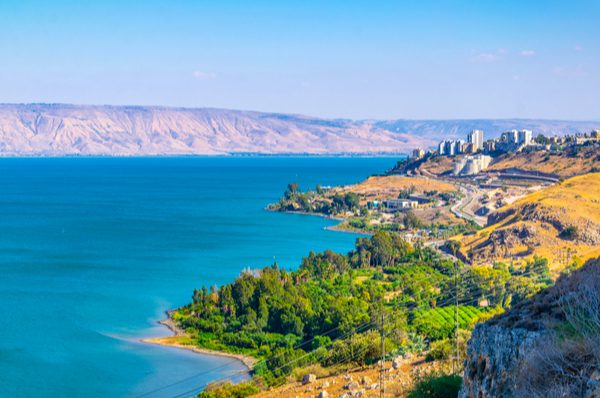
TORAH
NEVI'IM
KETUVIM
Chapter 4
Translation and Transliteration of
Listen to this chapter in Hebrew:
- Commentary
- Buy E-book
- Buy the Israel Bible
1The Israelites again did what was offensive to Hashem—Ehud now being dead.
va-yo-SI-fu b'-NAY yis-ra-AYL la-a-SOT ha-RA b'-ay-NAY a-do-NAI v'-ay-HUD MAYT
אוַיֹּסִפוּ בְּנֵי יִשְׂרָאֵל לַעֲשׂוֹת הָרַע בְּעֵינֵי יְהֹוָה וְאֵהוּד מֵת׃
2And Hashem surrendered them to King Jabin of Canaan, who reigned in Hazor. His army commander was Sisera, whose base was Harosheth-goiim.
va-yim-k'-RAYM a-do-NAI b'-YAD ya-VEEN me-lekh k'-NA-an a-SHER ma-LAKH b'-kha-TZOR v'-sar tz'-va-O see-s'-RA v'-HU yo-SHAYV ba-kha-RO-shet ha-go-YIM
בוַיִּמְכְּרֵם יְהֹוָה בְּיַד יָבִין מֶלֶךְ־כְּנַעַן אֲשֶׁר מָלַךְ בְּחָצוֹר וְשַׂר־צְבָאוֹ סִיסְרָא וְהוּא יוֹשֵׁב בַּחֲרֹשֶׁת הַגּוֹיִם׃
3The Israelites cried out to Hashem; for he had nine hundred iron chariots, and he had oppressed Yisrael ruthlessly for twenty years.
va-yitz-a-KU v'-NAY yis-ra-AYL el a-do-NAI KEE t'-SHA may-OT re-khev bar-ZEL LO v'-HU la-KHATZ et b'-NAY yis-ra-AYL b'-khoz-KAH es-REEM sha-NAH
גוַיִּצְעֲקוּ בְנֵי־יִשְׂרָאֵל אֶל־יְהֹוָה כִּי תְּשַׁע מֵאוֹת רֶכֶב־בַּרְזֶל לוֹ וְהוּא לָחַץ אֶת־בְּנֵי יִשְׂרָאֵל בְּחָזְקָה עֶשְׂרִים שָׁנָה׃
4Devora, wife of Lappidoth, was a Neviah; she led Yisrael at that time.
ud-vo-RAH i-SHAH n'-vee-AH AY-shet la-pee-DOT HEE sho-f'-TAH et yis-ra-AYL ba-AYT ha-HEE
דוּדְבוֹרָה אִשָּׁה נְבִיאָה אֵשֶׁת לַפִּידוֹת הִיא שֹׁפְטָה אֶת־יִשְׂרָאֵל בָּעֵת הַהִיא׃
![]() Judges 4:4 Now Devora, a prophetess
Judges 4:4 Now Devora, a prophetess

Dona Gracia commemorative postage stamp
Throughout Jewish history, many women have followed the example of Devora, described in this verse as both a prophetess and a judge, by taking positions of leadership on behalf of their people. One example dates to the early Renaissance period, when another Jewish woman emerged as a great leader of her people. At the time, the Jews of Spain faced the horrific persecutions of the Inquisition. But despite the strict prohibitions against practicing Judaism, many of the forced converts known as Anussim or “Crypto-Jews” continued to observe their religion in secret. Dona Gracia (1510–1569) discovered her Jewish identity only after she was married, but from that moment on, she was determined to bring respite to her people. As one of the wealthiest women in Europe, she was able to create an escape network for many of the Anussim, and eventually used her position of power to negotiate with Sultan Suleiman the Magnificent for a long term lease on the Tiberias region of the Land of Israel, of which she became the ruling authority. She began to rebuild the Galilee’s abandoned towns for other Anussim to settle in, and aimed to turn Tiberias into a major center of Jewish settlement, trade and learning. Today, visitors to the contemporary city of Teveria (Tiberias) can visit the Dona Gracia museum to learn about this fascinating woman who pursued one of the earliest attempts to create a Zionist movement.
5She used to sit under the Palm of Devora, between Rama and Beit El in the hill country of Efraim, and the Israelites would come to her for decisions.
v'-HEE yo-SHE-vet ta-khat TO-mer d'-vo-RAH BAYN ha-ra-MAH u-VAYN bayt AYL b'-HAR ef-RA-yim va-ya-a-LU ay-LE-ha b'-NAY yis-ra-AYL la-mish-PAT
הוְהִיא יוֹשֶׁבֶת תַּחַת־תֹּמֶר דְּבוֹרָה בֵּין הָרָמָה וּבֵין בֵּית־אֵל בְּהַר אֶפְרָיִם וַיַּעֲלוּ אֵלֶיהָ בְּנֵי יִשְׂרָאֵל לַמִּשְׁפָּט׃
6She summoned Barak son of Abinoam, of Kedesh in Naftali, and said to him, “Hashem, the God of Yisrael, has commanded: Go, march up to Mount Tavor, and take with you ten thousand men of Naftali and Zevulun.
va-tish-LAKH va-tik-RA l'-va-RAK ben a-vee-NO-am mi-KE-desh naf-ta-LEE va-TO-mer ay-LAV ha-lo tzi-VAH a-do-NAI e-lo-hay yis-ra-AYL LAYKH u-ma-shakh-TA b'-HAR ta-VOR v'-la-kakh-TA i-m'-KHA a-SE-ret a-la-FEEM EESH mi-b'-NAY naf-ta-LEE u-mi-b'-NAY z'-vu-LUN
ווַתִּשְׁלַח וַתִּקְרָא לְבָרָק בֶּן־אֲבִינֹעַם מִקֶּדֶשׁ נַפְתָּלִי וַתֹּאמֶר אֵלָיו הֲלֹא צִוָּה יְהֹוָה אֱלֹהֵי־יִשְׂרָאֵל לֵךְ וּמָשַׁכְתָּ בְּהַר תָּבוֹר וְלָקַחְתָּ עִמְּךָ עֲשֶׂרֶת אֲלָפִים אִישׁ מִבְּנֵי נַפְתָּלִי וּמִבְּנֵי זְבֻלוּן׃
![]() 4:6 Go, march up to Mount Tavor, and take with you ten thousand men
4:6 Go, march up to Mount Tavor, and take with you ten thousand men

Mount Tavor in Northern Israel
The prophetess and judge Devora instructs Barak in God’s name that he is to “march up to Mount Tavor” and take ten thousand soldiers with him, to prepare to fight the enemy Sisera. Metzudat David points out that taking the soldiers does not mean he was to simply draft them into service. Rather, it means to “draw at their hearts,” so that they would overcome their natural fear of Sisera and fight courageously. Rabbi Shlomo Aviner notes that this teaches us an important lesson, which remains relevant to this day: the importance of paying attention to the emotional state of the soldiers of Israel. He writes, “The secret weapon of the Israeli Defense Forces is their morale, strength and courage.”
7And I will draw Sisera, Jabin's army commander, with his chariots and his troops, toward you up to the Wadi Kishon; and I will deliver him into your hands.”
u-ma-shakh-TEE ay-LE-kha el NA-khal kee-SHON et see-s'-RA sar tz'-VA ya-VEEN v'-et rikh-BO v'-et ha-mo-NO un-ta-TEE-hu b'-ya-DE-kha
זוּמָשַׁכְתִּי אֵלֶיךָ אֶל־נַחַל קִישׁוֹן אֶת־סִיסְרָא שַׂר־צְבָא יָבִין וְאֶת־רִכְבּוֹ וְאֶת־הֲמוֹנוֹ וּנְתַתִּיהוּ בְּיָדֶךָ׃
8But Barak said to her, “If you will go with me, I will go; if not, I will not go.”
va-YO-mer ay-LE-ha ba-RAK im tay-l'-KHEE i-MEE v'-ha-lakh-TEE v'-im LO tay-l'-KHEE i-MEE LO ay-LAYKH
חוַיֹּאמֶר אֵלֶיהָ בָּרָק אִם־תֵּלְכִי עִמִּי וְהָלָכְתִּי וְאִם־לֹא תֵלְכִי עִמִּי לֹא אֵלֵךְ׃
9“Very well, I will go with you,” she answered. “However, there will be no glory for you in the course you are taking, for then Hashem will deliver Sisera into the hands of a woman.” So Devora went with Barak to Kedesh.
va-TO-mer ha-LOKH ay-LAYKH i-MAKH E-fes KEE LO tih-YEH tif-ar-t'-KHA al ha-DE-rekh a-SHER a-TAH ho-LAYKH KEE v'-YAD i-SHAH yim-KOR a-do-NAI et sees-RA va-TA-kom d'-vo-RAH va-TAY-lekh im ba-RAK KED-shah
טוַתֹּאמֶר הָלֹךְ אֵלֵךְ עִמָּךְ אֶפֶס כִּי לֹא תִהְיֶה תִּפְאַרְתְּךָ עַל־הַדֶּרֶךְ אֲשֶׁר אַתָּה הוֹלֵךְ כִּי בְיַד־אִשָּׁה יִמְכֹּר יְהֹוָה אֶת־סִיסְרָא וַתָּקָם דְּבוֹרָה וַתֵּלֶך עִם־בָּרָק קֶדְשָׁה׃
10Barak then mustered Zevulun and Naftali at Kedesh; ten thousand men marched up after him; and Devora also went up with him.
va-yaz-AYK ba-RAK et z'-vu-LUN v'-et naf-ta-LEE KED-shah va-YA-al b'-rag-LAV a-SE-ret al-FAY EESH va-TA-al i-MO d'-vo-RAH
יוַיַּזְעֵק בָּרָק אֶת־זְבוּלֻן וְאֶת־נַפְתָּלִי קֶדְשָׁה וַיַּעַל בְּרַגְלָיו עֲשֶׂרֶת אַלְפֵי אִישׁ וַתַּעַל עִמּוֹ דְּבוֹרָה׃
11Now Chever the Kenite had separated from the other Kenites, descendants of Hobab, father-in-law of Moshe, and had pitched his tent at Elon-bezaanannim, which is near Kedesh.
v'-KHE-ver ha-kay-NEE nif-RAD mi-KA-yin mi-b'-NAY kho-VAV kho-TAYN mo-SHEH va-YAYT ad ay-LON b'-tza-a-na-NEEM a-SHER et KE-desh
יאוְחֶבֶר הַקֵּינִי נִפְרָד מִקַּיִן מִבְּנֵי חֹבָב חֹתֵן מֹשֶׁה וַיֵּט אָהֳלוֹ עַד־אֵלוֹן בצענים [בְּצַעֲנַנִּים] אֲשֶׁר אֶת־קֶדֶשׁ׃
12Sisera was informed that Barak son of Abinoam had gone up to Mount Tavor.
va-ya-GI-du l'-sees-RA KEE a-LAH ba-RAK ben a-vee-NO-am har ta-VOR
יבוַיַּגִּדוּ לְסִיסְרָא כִּי עָלָה בָּרָק בֶּן־אֲבִינֹעַם הַר־תָּבוֹר׃
13So Sisera ordered all his chariots—nine hundred iron chariots—and all the troops he had to move from Harosheth-goiim to the Wadi Kishon.
va-yaz-AYK sees-RA et kol rikh-BO t'-SHA may-OT RE-khev bar-ZEL v'-et kol ha-AM a-SHER i-TO may-kha-RO-shet ha-go-YIM el NA-khal kee-SHON
יגוַיַּזְעֵק סִיסְרָא אֶת־כָּל־רִכְבּוֹ תְּשַׁע מֵאוֹת רֶכֶב בַּרְזֶל וְאֶת־כָּל־הָעָם אֲשֶׁר אִתּוֹ מֵחֲרֹשֶׁת הַגּוֹיִם אֶל־נַחַל קִישׁוֹן׃
14Then Devora said to Barak, “Up! This is the day on which Hashem will deliver Sisera into your hands: Hashem is marching before you.” Barak charged down Mount Tavor, followed by the ten thousand men,
va-TO-mer d'-vo-RAH el ba-RAK KUM KEE ZEH ha-YOM a-SHER na-TAN a-do-NAI et sees-RA b'-ya-DE-kha ha-LO a-do-NAI ya-TZA l'-fa-NE-kha va-YAY-red ba-RAK may-HAR ta-VOR va-a-SE-ret a-la-FEEM EESH a-kha-RAV
ידוַתֹּאמֶר דְּבֹרָה אֶל־בָּרָק קוּם כִּי זֶה הַיּוֹם אֲשֶׁר נָתַן יְהֹוָה אֶת־סִיסְרָא בְּיָדֶךָ הֲלֹא יְהֹוָה יָצָא לְפָנֶיךָ וַיֵּרֶד בָּרָק מֵהַר תָּבוֹר וַעֲשֶׂרֶת אֲלָפִים אִישׁ אַחֲרָיו׃
15and Hashem threw Sisera and all his chariots and army into a panic before the onslaught of Barak. Sisera leaped from his chariot and fled on foot
va-YA-hom a-do-NAI et sees-RA v'-et kol ha-RE-khev v'-et kol ha-ma-kha-NEH l'-fee KHE-rev lif-NAY va-RAK va-YAY-red sees-RA may-AL ha-mer-ka-VAH va-YA-nos b'-rag-LAV
טווַיָּהָם יְהֹוָה אֶת־סִיסְרָא וְאֶת־כָּל־הָרֶכֶב וְאֶת־כָּל־הַמַּחֲנֶה לְפִי־חֶרֶב לִפְנֵי בָרָק וַיֵּרֶד סִיסְרָא מֵעַל הַמֶּרְכָּבָה וַיָּנָס בְּרַגְלָיו׃
16as Barak pursued the chariots and the soldiers as far as Harosheth-goiim. All of Sisera's soldiers fell by the sword; not a man was left.
u-va-RAK ra-DAF a-kha-RAY ha-RE-khev v'-a-kha-RAY ha-ma-kha-NEH AD kha-RO-shet ha-go-YIM va-yi-POL kol ma-kha-NAY sees-RA l'-fee KHE-rev LO nish-AR ad e-KHAD
טזוּבָרָק רָדַף אַחֲרֵי הָרֶכֶב וְאַחֲרֵי הַמַּחֲנֶה עַד חֲרֹשֶׁת הַגּוֹיִם וַיִּפֹּל כָּל־מַחֲנֵה סִיסְרָא לְפִי־חֶרֶב לֹא נִשְׁאַר עַד־אֶחָד׃
17Sisera, meanwhile, had fled on foot to the tent of Yael, wife of Chever the Kenite; for there was friendship between King Jabin of Hazor and the family of Chever the Kenite.
v'-sees-RA NAS b'-rag-LAV el O-hel ya-AYL AY-shet KHE-ver ha-kay-NEE KEE sha-LOM BAYN ya-VEEN ME-lekh kha-TZOR u-VAYN BAYT KHE-ver ha-kay-NEE
יזוְסִיסְרָא נָס בְּרַגְלָיו אֶל־אֹהֶל יָעֵל אֵשֶּׁת חֶבֶר הַקֵּינִי כִּי שָׁלוֹם בֵּין יָבִין מֶלֶךְ־חָצוֹר וּבֵין בֵּית חֶבֶר הַקֵּינִי׃
18Yael came out to greet Sisera and said to him, “Come in, my lord, come in here, do not be afraid.” So he entered her tent, and she covered him with a blanket.
va-tay-TZAY ya-AYL lik-RAT sees-RA va-TO-mer ay-LAV su-RAH a-do-NEE su-RAH ay-LAI al tee-RA va-YA-sar ay-LE-ha ha-O-he-lah va-t'-kha-SAY-hu ba-s'-mee-KHAH
יחוַתֵּצֵא יָעֵל לִקְרַאת סִיסְרָא וַתֹּאמֶר אֵלָיו סוּרָה אֲדֹנִי סוּרָה אֵלַי אַל־תִּירָא וַיָּסַר אֵלֶיהָ הָאֹהֱלָה וַתְּכַסֵּהוּ בַּשְּׂמִיכָה׃
19He said to her, “Please let me have some water; I am thirsty.” She opened a skin of milk and gave him some to drink; and she covered him again.
va-YO-mer ay-LE-ha hash-kee-nee NA m'-at MA-yim KEE tza-MAY-tee va-tif-TAKH et NOD he-kha-LAV va-tash-KAY-hu va-t'-kha-SAY-hu
יטוַיֹּאמֶר אֵלֶיהָ הַשְׁקִינִי־נָא מְעַט־מַיִם כִּי צָמֵאתִי וַתִּפְתַּח אֶת־נֹאוד הֶחָלָב וַתַּשְׁקֵהוּ וַתְּכַסֵּהוּ׃
20He said to her, “Stand at the entrance of the tent. If anybody comes and asks you if there is anybody here, say ‘No.'”
va-YO-mer ay-LE-ha a-MOD PE-takh ha-O-hel v'-ha-YAH im EESH ya-VO ush-ay-LAYKH v'-a-MAR ha-yaysh POH EESH v'-a-MAR-t' A-yin
כוַיֹּאמֶר אֵלֶיהָ עֲמֹד פֶּתַח הָאֹהֶל וְהָיָה אִם־אִישׁ יָבוֹא וּשְׁאֵלֵךְ וְאָמַר הֲיֵשׁ־פֹּה אִישׁ וְאָמַרְתְּ אָיִן׃
21Then Yael wife of Chever took a tent pin and grasped the mallet. When he was fast asleep from exhaustion, she approached him stealthily and drove the pin through his temple till it went down to the ground. Thus he died.
va-ti-KAKH ya-AYL AY-shet KHE-ver et y'-TAD ha-O-hel va-TA-sem et ha-ma-KE-vet b'-ya-DAH va-ta-VO ay-LAV ba-LAT va-tit-KA et ha-ya-TAYD b'-ra-ka-TO va-titz-NAKH ba-A-retz v'-HU nir-DAM va-YA-af va-ya-MOT
כאוַתִּקַּח יָעֵל אֵשֶׁת־חֶבֶר אֶת־יְתַד הָאֹהֶל וַתָּשֶׂם אֶת־הַמַּקֶּבֶת בְּיָדָהּ וַתָּבוֹא אֵלָיו בַּלָּאט וַתִּתְקַע אֶת־הַיָּתֵד בְּרַקָּתוֹ וַתִּצְנַח בָּאָרֶץ וְהוּא־נִרְדָּם וַיָּעַף וַיָּמֹת׃
![]() 4:21 Then Yael wife of Chever took a tent pin and grasped the mallet
4:21 Then Yael wife of Chever took a tent pin and grasped the mallet

Orna Barbavai (b. 1962)
Yael is not the only great woman to act as a warrior on behalf of the Nation of Israel. Today, women form an important part of the Israel Defense Forces, serving at its highest levels. In 2011, Orna Barbavai made history, overcoming her underprivileged upbringing to become the first woman in IDF history to reach the rank of Aluf (אלוף), ‘Major General’. “I am proud to be the first woman to become a major general, and to be part of an organization in which equality is a central principle,” Barbivai said. The mother of three retired from the IDF in 2014, but serves as an inspiration to countless Israeli young women who enlist in the IDF each year and who know they can reach the highest levels not only in the IDF but throughout Israeli society.
22Now Barak appeared in pursuit of Sisera. Yael went out to greet him and said, “Come, I will show you the man you are looking for.” He went inside with her, and there Sisera was lying dead, with the pin in his temple.
v'-hi-NAY va-RAK ro-DAYF et sees-RA va-TAY-tzay ya-AYL lik-ra-TO va-TO-mer LO LAYKH v'-ar-AYKH et ha-EESH a-sher a-TAH m'-va-KAYSH va-ya-VO ay-LE-ha v'-hi-NAY sees-RA no-FAYL MAYT v'-ha-ya-TAYD b'-ra-ka-TO
כבוְהִנֵּה בָרָק רֹדֵף אֶת־סִיסְרָא וַתֵּצֵא יָעֵל לִקְרָאתוֹ וַתֹּאמֶר לוֹ לֵךְ וְאַרְאֶךָּ אֶת־הָאִישׁ אֲשֶׁר־אַתָּה מְבַקֵּשׁ וַיָּבֹא אֵלֶיהָ וְהִנֵּה סִיסְרָא נֹפֵל מֵת וְהַיָּתֵד בְּרַקָּתוֹ׃
23On that day Hashem subdued King Jabin of Canaan before the Israelites.
va-yakh-NA e-lo-HEEM ba-YOM ha-HU AYT ya-VEEN me-lekh k'-NA-an lif-NAY b'-NAY yis-ra-AYL
כגוַיַּכְנַע אֱלֹהִים בַּיּוֹם הַהוּא אֵת יָבִין מֶלֶךְ־כְּנָעַן לִפְנֵי בְּנֵי יִשְׂרָאֵל׃
24The hand of the Israelites bore harder and harder on King Jabin of Canaan, until they destroyed King Jabin of Canaan.
va-TAY-lekh YAD b'-NAY yis-ra-AYL ha-LOKH v'-ka-SHAH AL ya-VEEN me-lekh k'-NA-an AD a-SHER hikh-REE-tu AYT ya-VEEN me-lekh k'-NA-an
כדוַתֵּלֶךְ יַד בְּנֵי־יִשְׂרָאֵל הָלוֹךְ וְקָשָׁה עַל יָבִין מֶלֶךְ־כְּנָעַן עַד אֲשֶׁר הִכְרִיתוּ אֵת יָבִין מֶלֶךְ־כְּנָעַן׃










